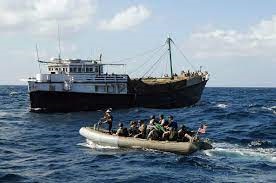Maritime piracy continues to have a negative impact on the economic growth of the Gulf of Guinea countries. Among these impacts, maritime crime poses serious threats to international trade, the safety of seafarers and regional and global development.
The concerted efforts of regional and international navies in recent months show a marked reduction in piracy incidents. From 16 in the first quarter of 2021, incidents decreased to 7 during the same period in 2022. Despite this, the coastal zone continues to record maritime crimes that threaten international trade, the safety of seafarers and regional and global development. At the launch of an anti-piracy project in the Gulf of Guinea, Japan’s Ambassador to Nigeria, Kazuyoshi Matsunaga, denounced the fact that piracy in the Gulf of Guinea region continues to discourage foreign investment, hinder international trade and businesses along the corridor. Kazuyoshi Matsunaga deplored the fact that piracy in the region has also been a recurring phenomenon of serious concern to the riparian countries of the region and the international community. Tomoyoshi Maehira who represented the first secretary said that piracy activities not only remain a serious threat to trade and businesses in coastal communities, but also delay the economies of the Gulf of Guinea countries, especially Nigeria. He revealed that it was in this context that the Japanese government decided to fund the regional and national anti-piracy project in order to ensure peace and stability in the Gulf of Guinea and to stimulate regional and global exchanges.
Illicit arms flows encouraging piracy
To justify the reluctance of this scourge, the former Nigerian Chief of the Defence Staff, retired General Martin Luther Agwai, points out that the influx of illicit weapons encourages piracy in the Gulf of Guinea. « Piracy has become increasingly sophisticated with the influx of small arms and light weapons into the hands of pirates and criminals on the waterways and on the high seas, » he said. The maritime domain represents the traffic of most global goods and services through various sea crossings such as the China Sea, the Strait of Singapore, the Gulf of Mexico, the Gulf of Aden and the Gulf of Guinea, among others. However, some of these sea crossings continued to be subject to hijacking, kidnapping, theft and piracy. Reports of piracy and other maritime crimes in the Gulf of Guinea had continued to threaten the ease of movement of goods and services. Awareness of the economic importance of this maritime route for regional and international trade and business has prompted the Government of Japan, in partnership with UNDP, to intervene to finance projects in this area. The Gulf of Guinea Counter-Piracy and Response Project is essential to ensure the safety and security of traders and seafarers and aims to increase international trade, thereby contributing to sustainable development. This project is a continuation of the inaugural project – Capacity building to fight piracy for MLAILPKC – implemented between March 2021 and March 2022 by MLAILPKC
Adapted and Translated from French into English by:
Albéric Djomaki,
CEO at LMS (www.lmsgroupafrica.com)
American Translators Association (ATA) Associate Member
References:



